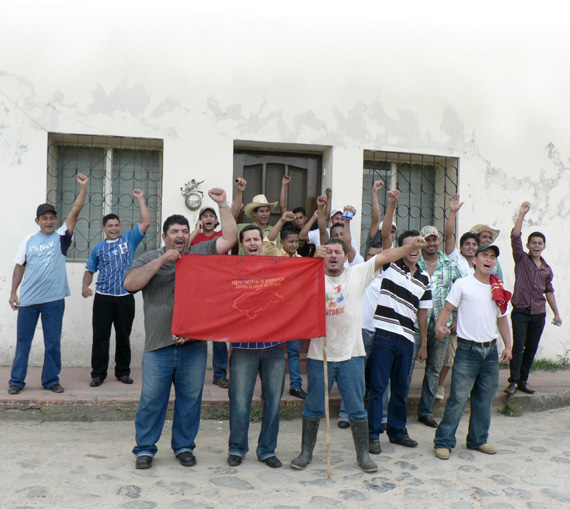|
After the signing of a
Letter of Commitment on April 14, the members of the United Peasants Movement of
Aguán (MUCA) decided to accept the government’s proposal to grant them 11,000
hectares of land. At the signing ceremony of this historical agreement, hundreds
of peasants and National Popular Resistance Front (FNRP) activists rallied to
demand that president Porfirio Lobo remove the massive military and police
presence in Bajo Agúan.
Heavily guarded
by an unprecedentedly large security contingent and with several peasant
communities still surrounded and threatened by army and police forces, president
Porfirio Lobo arrived at the city of Trujillo, in Valle del Aguán, to
sign the agreement.
But what
Lobo certainly did not expect to find there were the hundreds of Resistance
and peasant organization members that welcomed him by protesting against the
current situation in that region of the country.
“Coup-plotters
out of Aguán!”, “The people of Aguán don’t want coup-plotters in their midst”,
“What do the people want? A Constituent Assembly!”, were the chants that rang
loudest in the old Spanish fortress where the ceremony took place, as president
Lobo came out to give a brief speech to the crowds gathered outside.
And even
greater was his surprise when the entire MUCA delegation and the majority
of the people in attendance raised their left fists during the singing of the
national anthem as is customary at Resistance rallies.
“We began this process of
negotiation because there are real needs that we need to address. It has been a
process conducted amidst dangerous conditions, threats and repression. But we’ve
come out of it stronger,”
Rudy
Hernández, a member of the MUCA negotiating committee, said.
“We cannot
forget that we’ve lost several fellow activists in the years we’ve been
struggling. Six peasants were murdered, and we will always hold them close to
our hearts,” Hernández explained. “Their memory will help us continue our
struggle against the powerful who seek to maintain the country’s wealth
concentrated in a handful of people,” he added.
“This agreement recognizes that
the land must be in the hands of peasants, in our hands, because we are the ones
who work the land, and we do so with devotion and sacrifice.”
“It’s the beginning of a process
that cannot be stopped,”
the
MUCA member concluded before signing the agreement, highlighting that the
goal is not just to grow African palm but also to implement other projects that
will guarantee the food security of thousands of families.
The
signing of the agreement was also an opportunity for the legal representatives
of MUCA to demand an end to the repressive actions that are targeting peasant
organizations.
More than 200 court
actions against members of these organizations are currently in progress, and
the wave of repression in Bajo Aguán has not let up.
We’ll honor the agreements
According to
the director of the National Agricultural Institute (INA), César Ham,
a process will be launched this week to identify the plots to be distributed and
determine the relocation of the MUCA families, in order to begin
implementing the different clauses of the Agreement.
“We want to
begin as soon as possible to benefit everyone involved, and the president has
given his word that he will withdraw the military and police forces that are
deployed around the areas where MUCA members are to be relocated.”
“We’ve invited
human rights organizations to accompany us in this process so they can make sure
that no violations of any kind are committed,” Ham told
Sirel.
The INA
director went on to explain that the beneficiaries will be granted ownership
deeds for the lands they receive and that “this process begins by defining the
legal form that the peasants’ organization will have, followed by the assignment
of the plots to the peasants.”
“We are going
to fully comply with the agreement signed with MUCA,” Ham
concluded.
Oligarchy looks
on with concern
Despite excitement over the outcome of the agreement, it was evident that on
this issue president Porfirio Lobo
has distanced himself from the large
palm-growing landowners who seek to maintain their hold on most lands in the
area.
Sirel was
able to get through the heavy security contingent guarding the president to ask
him about this matter. The answer he gave was evasive. “Everything’s been
discussed and arranged,” was Lobo’s brief response.
Just a few hours
later, SIREL heard that Miguel Facussé Barjum, a powerful palm producer, had
filed a court action against the agreement.
Solidarity has
been key
For Wifredo Paz, MUCA spokesperson, the solidarity of national and
international organizations has been a key support in the peasants’ struggle.
“If it hadn’t been
for the national and international solidarity we’ve received from the country’s
human rights organizations, the IUF and others, we would’ve witnessed a massacre
here.”
“The pressure exerted by the many public communications, denunciations, letters
and signature campaigns has been instrumental in halting violent actions against
MUCA.
For us, this support has been invaluable and I take this opportunity to thank
you all on behalf of MUCA,” Paz concluded.
|
The main points of the Agreement
MUCA
peasants will immediately receive 3,000 hectares already planted
with African palm, and within a term of three months they will
receive an additional 3,000 hectares of uncultivated land, prior
voluntary evacuation of the currently recovered lands.
In
addition, they will receive another 1,000 hectares of crops and
4,000 hectares of uncultivated land within no more than one year.
|
 |